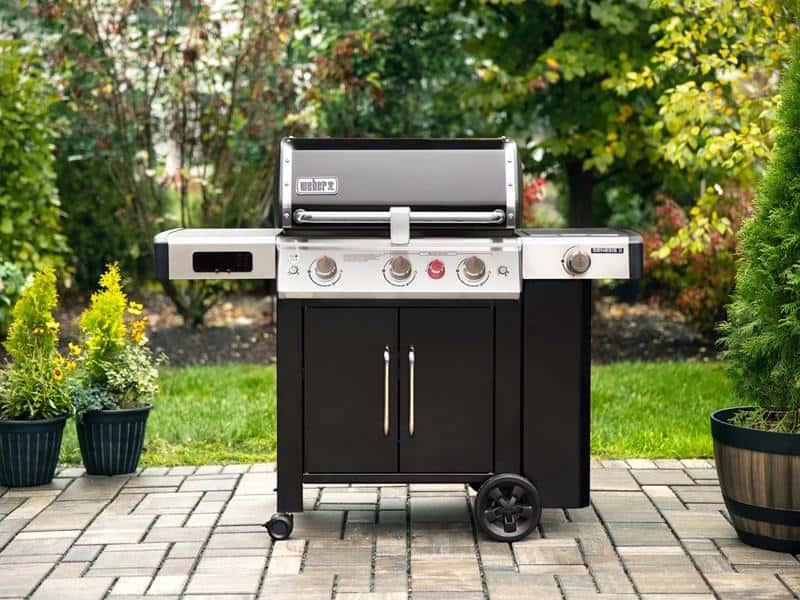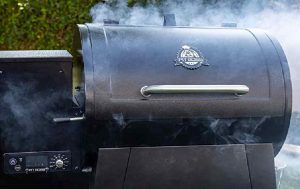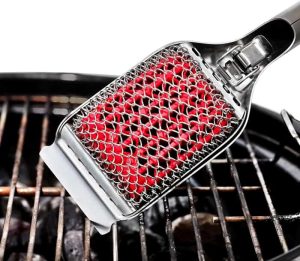Weber grills are known for their quality, durability, and excellent grilling experience.
However, like any appliance, taking good care of your Weber grill will ensure it lasts longer and keeps delivering those delicious, perfectly cooked meals.
In this guide, we’ve compiled essential tips and insights to help you make the most out of your Weber grill and keep it in top-notch condition for years to come.
- How Long Do Weber Grills Last?
- How Long Do Weber Grills Parts Last?
- 8 Effective Ways to Maximize Your Weber Grill’s Longevity
How Long Do Weber Grills Last?
Are you curious about the longevity of Weber gas grills and whether they can match the legendary status of their kettle counterparts from the 1990s?
Look no further, as we’ve combined insights from various sources to give you the scoop on Weber grill lifespans.
Weber gas grills are renowned for their durability, quality materials, and outstanding warranty, with most components guaranteed to last between 5 and 10 years.
However, the actual lifespan of your grill will depend on several factors, including maintenance practices, the specific model, how often you use it, and the type and quantity of food you cook.
Based on data from over a thousand customer reviews, the average Weber grill tends to last between 5 and 10 years.
That being said, if you’re a frequent griller who loves cooking up large quantities of food, you might find that your grill’s parts wear out more quickly.
On the other hand, if you neglect your grill and don’t provide proper care, it may only last for five years or less.
To ensure your Weber gas grill remains in top shape and enjoys a long, happy life, it’s essential to follow appropriate maintenance tips and tricks before and after each grilling season.
In doing so, you can maximize your grill’s lifespan, letting you savor many more years of delicious barbecue delights.

How Long Do Weber Grills Parts Last?
When it comes to the durability of Weber grill parts, it’s important to know that not all components are created equal.
Each part of your Weber grill is designed to last a specific amount of time, ensuring that your grill remains a reliable companion for many cookouts to come.
Some of the most durable Weber grill parts include:
- Bowls and lids: Guaranteed for 10 years with no rust or burn-through.
- Cook boxes: 5-10 years, depending on the model.
- Stainless steel cooking grates and Flavorizer bars: 5 years with no rust or burn-through.
- Plastic parts: 5 or more years (not guaranteed against fading or discoloring).
All other parts: Guaranteed for 2 or more years.
In particular, stainless steel cooking grates can comfortably last for ten years, while porcelain-plated grill grates can last up to 6 years.
The cook box and other plastic parts can typically endure for at least seven years.
Even when these parts eventually wear out, they can be easily and affordably replaced, contributing to Weber Grills’ reputation for longevity.
However, some Weber grill parts are more prone to damage and may have shorter lifespans:
- Igniters: According to a 2018 Consumer Report, igniters last an average of four years. Damage to the wires can affect the entire ignition system.
- Burner tubes: These often last four years or less due to easy clogging, which can result in uneven cooking.
- Burner covers: With a lifespan of two to five years, these are susceptible to damage from uncontrolled flare-ups during grilling.
To prolong the life of your Weber grill components, it’s essential to practice regular cleaning and maintenance.
By taking care of even the least durable parts, you can keep your grill in tip-top condition for an extended period, ensuring many more years of delicious barbecues with friends and family.
8 Effective Ways to Maximize Your Weber Grill’s Longevity
To ensure your Weber grill remains a trusty companion for years to come, follow these essential tips to prolong its life:
1. Keep it clean:
Regularly clean the interior and exterior of your grill with a mild glass cleaner, warm soapy water, a sponge, a scrubbing brush, and a soft microfiber cloth.
Use the OneTouch cleaning system if available and clean the cooking grate after every use.
2. Use a cover:
Protect your grill from moisture, pests, and debris with a grill cover designed for your specific model. If you live in a harsher climate, opt for a premium cover that provides thermal protection and resists rough weather.
3. Check parts regularly:
Inspect all grill components twice a year, looking for wear, dirt, or damage. Replace any problematic parts promptly to prevent further issues.
4. Grill in foil:
Wrap your food in aluminum foil before grilling to reduce grease and debris on the grates, making cleaning easier and extending the life of your grill.
5. Store your grill indoors:
Keep your grill in a garage, basement, or under an awning to protect it from the elements and reduce wear and tear.
6. Deep clean once a year:
Disassemble and thoroughly clean your grill at the end of the summer season to ensure optimal performance.
7. Watch for rust:
Regularly check for signs of rust, and treat any affected areas immediately to prevent it from spreading and causing damage.
8. Use grill accessories:
Invest in grill-specific accessories, such as a grill brush, to maintain your grill properly and extend its lifespan.
Remember, taking good care of your Weber grill will not only provide you with delicious barbecues for years to come but also save you time and money in the long run.
Related >> How to Use Wood Chips on a Gas Grill (3 Easy Steps)
Final Thoughts
Maintaining your Weber grill is all about consistency, diligence, and a little bit of love.
By following these valuable tips, you’ll not only prolong the life of your grill but also enjoy consistently delicious meals and an overall better grilling experience.
So, roll up your sleeves, grab your cleaning supplies, and get ready to show your Weber grill some well-deserved TLC.
>> Visit our extensive BBQ guides page for more articles that are similar to this one.
Greetings! I’m Chad, a 43-year-old barbecue aficionado hailing from the beautiful state of Texas. I’m thrilled to invite you on a culinary journey as we explore the art of grilling and smoking together. Through this blog, I aim to ignite your passion for barbecue by offering:
Scrumptious, time-honored BBQ recipes passed down through generations, guaranteed to tantalize your taste buds.
Expert guidance on mastering the grill, smoker, and diverse cooking techniques to elevate your barbecue game.
Recommendations on choosing the perfect tools and equipment tailored to your grilling requirements.
An inside look at the latest trends, innovations, and advancements in the ever-evolving world of barbecue.





